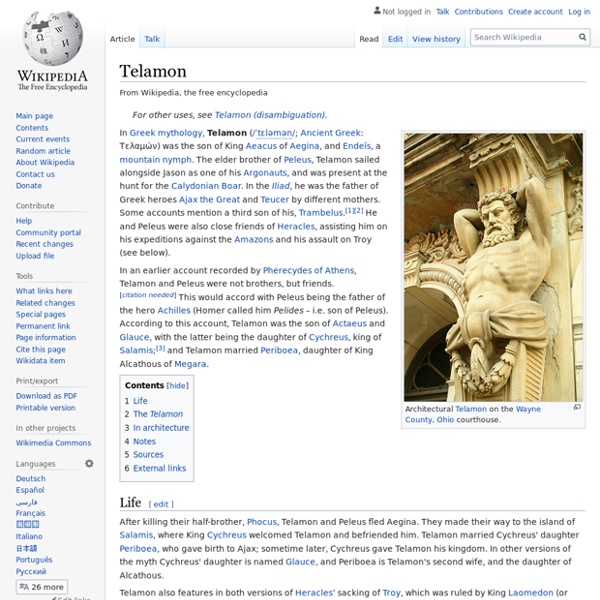Proserpina
Ancient Roman goddess Cult and myths[edit] Origin as Libera[edit] Libera was officially identified with Proserpina in 205 BC, when she acquired a Romanised form of the Greek mystery rites and their attendant mythology. In the late Republican era, Cicero described Liber and Libera as Ceres' children.
Themis
ancient Greek Titaness To the ancient Greeks she was originally the organizer of the "communal affairs of humans, particularly assemblies".[1] Moses Finley remarked of themis, as the word was used by Homer in the 8th century BCE, to evoke the social order of the 10th- and 9th-century Greek Dark Ages: Themis is untranslatable. A gift of the gods and a mark of civilized existence, sometimes it means right custom, proper procedure, social order, and sometimes merely the will of the gods (as revealed by an omen, for example) with little of the idea of right.[2] Mythology[edit]
Jason
We ask you, humbly: don't scroll away. Hi, reader in Canada, it seems you use Wikipedia a lot; that's great! This is the 6th appeal we've shown you. It's awkward, but this Thursday we need your help.
Pygmalion
Pygmalion or Pigmalion may refer to: Mythology[edit] Stage[edit] Film[edit]
Aegeus
Theseus Recognized by his Father by Hippolyte Flandrin (1832) In Greek mythology, Aegeus (; Ancient Greek: Αἰγεύς, romanized: Aigeús) was an archaic figure in the founding myth of Athens. The "goat-man" who gave his name to the Aegean Sea was, next to Poseidon, the father of Theseus, the founder of Athenian institutions and one of the kings of Athens.
Byzantine Empire
Roman Empire during Late Antiquity and the Middle Ages The Byzantine Empire, also referred to as the Eastern Roman Empire or Byzantium, was the continuation of the Roman Empire in its eastern provinces during Late Antiquity and the Middle Ages, when its capital city was Constantinople. It survived the fragmentation and fall of the Western Roman Empire in the 5th century and continued to exist for an additional thousand years until it fell to the Ottoman Empire in 1453.
Pyramus and Thisbe
Plot[edit] In Ovid's Metamorphoses, Pyramus and Thisbe are two lovers in the city of Babylon who occupy connected houses/walls, forbidden by their parents to be wed, because of their parents' rivalry. Through a crack in one of the walls, they whisper their love for each other. They arrange to meet near Ninus' tomb under a mulberry tree and state their feelings for each other. Thisbe arrives first, but upon seeing a lioness with a mouth bloody from a recent kill, she flees, leaving behind her veil. When Pyramus arrives he is horrified at the sight of Thisbe's veil in which the lioness had torn and left traces of blood behind, as well as its tracks.
Pittheus
Biography[edit] He was described by Euripides as the most pious son of Pelops, a wise man, and well versed on understanding the oracle thus sought by Aegeus.[6] Pittheus is said to have taught the art of speaking, and even to have written a book upon it.[7] Plutarch spoke of Pittheus' account in the following verses: "[Pittheus] had the highest repute as a man versed in the lore of his times and of the greatest wisdom. Now the wisdom of that day had some such form and force as that for which Hesiod was famous, especially in the sententious maxims of his 'Works and Days' .One of these maxims is ascribed to Pittheus, namely: — 'Payment pledged to a man who is dear must be ample and certain.' At any rate, this is what Aristotle the philosopher says, and Euripides, when he has Hippolytus addressed as 'nursling of the pure and holy Pittheus,' shows what the world thought of Pittheus.



